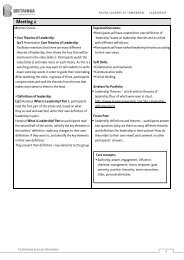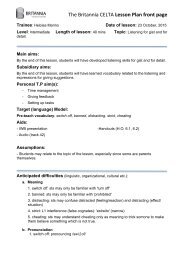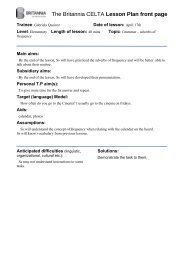Pages from Young Leaders - Leadership-2
Este arquivo inclui material do curso "Young Leaders of tomorrow", módulo Leadership. As páginas foram selecionadas aleatóriamente. O único objetivo deste documento é dar aos interessados uma idéia do conteúdo do curso. Este material inclui parte do planejamento, assim como material distribuido em sala de aula e não é o material completo.
Este arquivo inclui material do curso "Young Leaders of tomorrow", módulo Leadership. As páginas foram selecionadas aleatóriamente. O único objetivo deste documento é dar aos interessados uma idéia do conteúdo do curso.
Este material inclui parte do planejamento, assim como material distribuido em sala de aula e não é o material completo.
Create successful ePaper yourself
Turn your PDF publications into a flip-book with our unique Google optimized e-Paper software.
John Maxwell: “<strong>Leaders</strong>hip is influence – nothing more, nothing<br />
less.”<br />
I like minimalism but this reduction is too much. A robber with a gun has<br />
“influence” over his victim. A manager has the power to fire team<br />
members which provides a lot of influence. But does this influence make<br />
a robber or a manager a leader? Maxwell’s definition omits the source 11<br />
of influence.<br />
Glossary<br />
11.Source (n.) UK /sɔːs/ US /sɔːrs/<br />
the place something comes <strong>from</strong><br />
or starts at, or the cause of something<br />
12. Discretionary UK /dɪˈskreʃ.ən.ər.i/<br />
US /dɪˈskreʃ.ən.er.i/ based on<br />
someone’s judgment of a particular<br />
situation rather than on a set<br />
of rules<br />
So what is leadership?<br />
DEFINITION: <strong>Leaders</strong>hip is a process of social influence, which<br />
maximizes the efforts of others, towards the achievement of a goal.<br />
Notice key elements of this definition:<br />
<strong>Leaders</strong>hip stems <strong>from</strong> social influence, not authority or power<br />
<strong>Leaders</strong>hip requires others, and that implies they don’t need to be<br />
“direct reports”<br />
No mention of personality traits, attributes, or even a title; there are<br />
many styles, many paths, to effective leadership<br />
It includes a goal, not influence with no intended outcome<br />
Lastly, what makes this definition so different <strong>from</strong> many of the<br />
academic definitions out there is the inclusion of “maximizes the<br />
efforts”. Most of my work is in the area of employee engagement, and<br />
engaged employees give discretionary 12 effort.<br />
I guess technically a leader could use social influence to just organize the<br />
efforts of others, but I think leadership is about maximizing the effort.<br />
It’s not, “Hey everyone, let’s line up and get to the top of that hill<br />
someday.” But rather, “Hey, see that hill? Let’s see how fast we can get<br />
to the top…and I’ll buy the first round for anyone who can beat me up<br />
there.” So what do you think of my definition of leadership? Social<br />
influence, others, maximize effort, towards a goal. Do those key<br />
elements work for you?<br />
<strong>Young</strong> <strong>Leaders</strong> of Tomorrow—<strong>Leaders</strong>hip<br />
3











